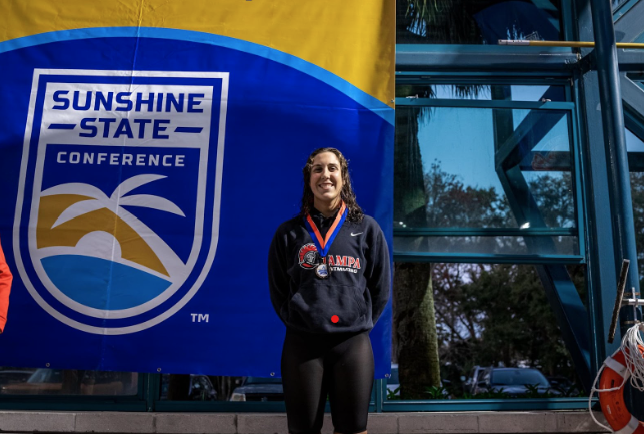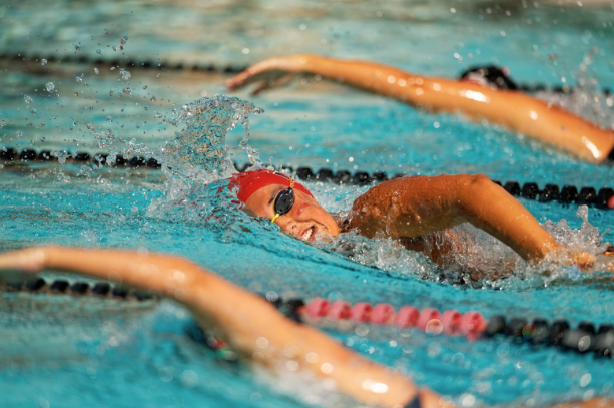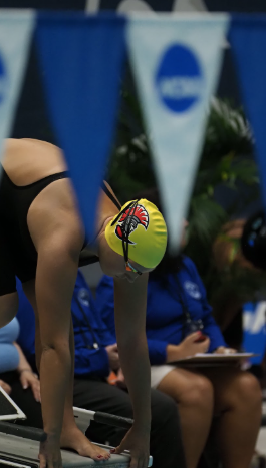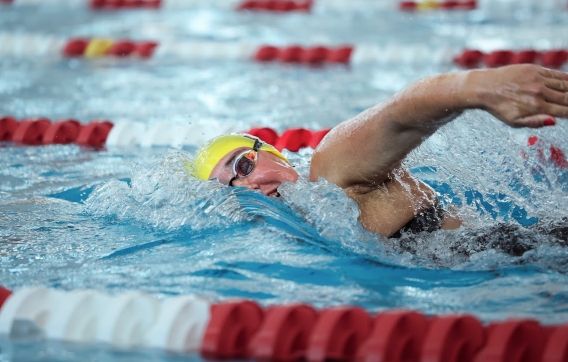Dear Swim Part II.
t this point leading into NCAAs my goals shifted. I just wanted to have fun. As much as I wanted to swim fast and score and everything everyone dreams of doing at NCAAs, only I knew how much of a struggle I went through during the past season

One thing I talked about in therapy was not paying attention to the results, which is not a good thing to do since you can have a good race but bad result and that doesn’t mean it’s a bad race. At our conference, however, I was having good races with good results. At this point leading into NCAAs my goals shifted. I just wanted to have fun. As much as I wanted to swim fast and score and everything everyone dreams of doing at NCAAs, only I knew how much of a struggle I went through during the past season. I made it to NCAAs, and I enjoyed it. I did not swim my greatest, but I got out of each race content on how I did and I just wanted to cheer on my teammates. Fast forward to the off season and my end of season meeting with my coach. I said I wanted to go into junior year better than sophomore year to have an all-around good year, mentally and physically. I wanted to make at least one NCAA B cut at or before midseason, and once again, I wanted to become an All-American. I knew this was something I was capable of doing coming off of the conference I had, but little did I know, junior year was going to be even harder than sophomore year. I went into junior year with a positive mindset taking everything I learned from the previous year to do the best I can. The first few weeks was just about getting back into everything and back to racing and in distance shape. During the intrasquad meet early in the season, I went my best times at that point of the season from all three years. This gave me the confidence I needed to start off with the season on a high note. My practices were good, they did not compare to how sophomore year was, but if I learned anything from sophomore year, it was that I needed to stay positive, believe in myself, and trust that everything will come together.
The first time that season I, as well as pretty much everyone else, noticed a change was during the first travel meet we had. I didn’t have a chance to swim the 1000 since there was a confusion with the heat sheets, so I had to focus on the next day with the 500. It was not a good race, but it wasn’t terrible because I went the same time as I did in practice earlier in the week. This was hard for me because it brought me back to where I was during sophomore year and when I noticed a shift in my mindset with the sport. After this race, I knew I was upset and I was about to cry, so I went to the farthest lane I could to cool down before going into the locker room and completely breaking down about it. After a little bit, I was able to calm myself down and go back out on deck to be with the rest of my team as well as swimming again in the meet. After this meet, talking with my parents, therapist, some of my teammates, and just reflecting on it, I realized how unhappy I was with not just the sport but how my mentality was with the sport.

Part of how I was feeling was that I wished I was physically injured. I wanted someone else to just tell me to stop because as much as I hated swimming and wanted to stop based on how I was mentally, I knew I couldn’t physically stop. I wouldn’t be truly fulfilled with my swim career if I ended it a year in a half early. So, I decided to show up to practice the next day. Meets and practices started to all blur together, I was upset with how meets were going and practices. I wasn't doing my best during them compared to previous years. I couldn’t understand why this was happening so far into my career and I felt like there wasn’t anything I could do to make a change.
During therapy, we would talk about taking everything one day at a time and one stroke at a time. If my body wasn’t feeling the best in the water during a practice, I would pick one aspect to put a focus on. I was vocal with my coach how I was doing, and my coach tried his best to help support me. Fast forward to mid-November and midseason travel team was going to be announced soon. This year was different from past seasons because Tampa was traveling to the University of South Carolina for their meet. I wanted to make the travel team for this meet, but in the back of my head, I knew I had a slim chance to make it just based on how my season was going as well as where I ranked based on times in my events. About a week before the travel team was announced, the lineup for a different meet happening that weekend was sent out. I was not going to that meet. It was weird not seeing my name listed on a meet lineup because throughout my time at Tampa, I went and swam at every single meet there was. Not going and swimming at a meet was something that I didn’t know because it never happened.

After seeing the lineup for that meet, I also had a gut feeling that I was not going to be traveling to South Carolina, which was also weird for me. I knew the travel team was going to be announced soon, but I just wanted to know if I was on it or not. I went to my head coach before practice and asked. He said I wasn’t going. I got very emotional after this because everything was hitting me at once that this season was not the way I wanted it to be. It took a little bit for me and my coach and captain talking to me to get me to calm down and be able to practice, which at that moment was just about the last thing I wanted to do.
But, looking back at this time now, not making that team was probably the best thing that could have happened to me, which normally wouldn’t be the case. There was such a small group not going, the coach who stayed was my distance coach, and I was the only distance swimmer who didn’t go. Because of all of this, I had my best week of training by a long shot in the entire season. I was going times in practices that would have put me on the travel team, and I felt peace again swimming, which was the first time I had that feeling all season long. I was relaxed and felt better with the sport and my mindset was reset and I started feeling better with the rest of the season.
However, this all changed when everyone got back again. I reverted to how everything was before and I didn’t really feel happy again, but I still decided to stay with it and finish out the season. This meant because I was finishing out junior year, I was also going to finish through senior year. I wasn’t going to stop with one year left. The rest of the season, I was just trying to get by. I knew I wasn’t going to be on the scoring team for conference, and by the time January and February hit, I was ready to be done. It was going to take a miracle for me to make NCAA’s this year and part of me wanted to make it to say I did, but a larger part of me just wanted to finish off the season, be done, and have a break. Conference came around, I wasn’t on the scoring team, and I just wanted to enjoy the last meet of the season with all of my teammates and celebrate the seniors who were finishing off their careers.

I wish I could say I remember what happened during this meet, but I know I swam my races the best I was able to, cheered everyone on, and tried to help others who were upset and not having their best meets. I wasn’t close to my personal best times at all, but I think I went season bests which I was surprisingly okay with. My best race though was the mile. This, again, was because I go into it with a “f*** it” mentality. It is the only way I can get through this event with any kind of positivity because it is my least favorite event out of all four that I swim. Since I wasn’t at midseason, I didn’t have a time entered, so I was in the last heat. I spent the time before I raced acting like I was already done with my race, and this was because one of the seniors who I trained with since freshman year was having her last race and I was cheering her on the entire time. This also helped me not even think about swimming. When it was my time to swim, I dove in and swam my race. I wasn’t thinking about doing well because I knew my season was going to be over once I finished this 1650.
As I was swimming, I was finally feeling like the old me in the water, and I couldn’t tell my splits or times, but I knew they were good, and I was going to have a good time. How did I know this? I saw my teammates and coaches cheering me, saying that I was on pace, and almost pushing me to go even faster. I was in control of my race from the moment I dove in, and the result was that I almost went my personal best time. I was two seconds off from the NCAA B cut. I was done with junior year. I was relieved to get out of that pool seeing my coaches, teammates, and parents being happy for me. Everyone knew how much I struggled, but having a race like that just brought the “old me” back to swimming.
As much as I was relieved being done with my season, it was still weird. I wasn’t going to practice the next day to prepare for NCAAs like I had done the seasons previously. I was able to go on a spring break to Punta Cana with my friends instead of being in Tampa training, I was celebrating my 21st birthday having a watch party for NCAA’s instead of spending my birthday swimming the 1000, and I was celebrating the boy's national championship win in Tampa instead of in Ohio with everyone else who made NCAA’s. These were all things that I got to do because I had the difficult season I did instead of what I thought I was going to be doing when I thought about how my junior season was going to go. But I wouldn’t change how the season went or how my mindset thinking about swimming is now, and most importantly, given everything that has happened, I still love this sport and am happy that I didn’t give up in such a hard time.
Thank you for everything so far and I look forward to our last year together,
Holly
Holly is currently finishing up her senior season at the University of Tampa. Thank you for sharing her personal story vulnerably with us to share here on Inward Athlete.
If you or someone you know is struggling with mental health, it's important to know that you're not alone, and help is available. There are numerous resources offering support, from hotlines and counseling services to online platforms and community groups. Reaching out can be the first step toward healing and finding the right support. Consider speaking to a professional, contacting a mental health hotline, or exploring mental health organizations that provide guidance, coping strategies, and assistance. Your well-being matters, and support is just a step away.
Here are some important mental health hotline numbers you can call for support:
National Suicide Prevention Lifeline:
988
(Available 24/7 for mental health crises, including suicide prevention)
Crisis Text Line:
Text HELLO to 741741
(24/7 texting support for mental health crises)
National Helpline for Mental Health:
1-800-662-HELP (1-800-662-4357)
(24/7 confidential assistance for mental health and substance use issues)
The Trevor Project (LGBTQ+ Crisis Support):
1-866-488-7386
(Available 24/7 for LGBTQ+ youth in crisis)
